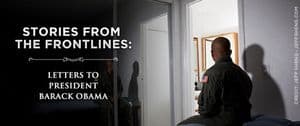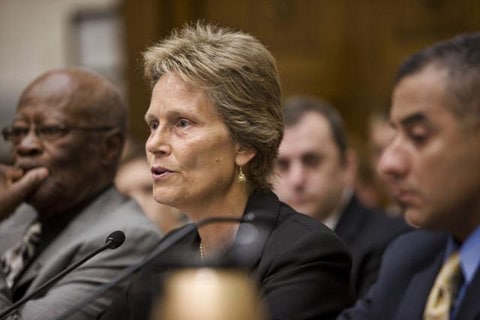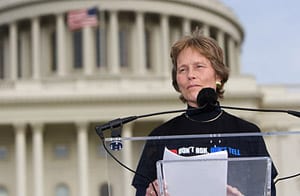In spite of that stress, somehow Lynne and I had learned to deal with "Don't Ask, Don't Tell"; we had made the requisite sacrifices. I had pretended to be straight and had played the games most gays in the military are all too familiar with.
But after Sept. 11 our perspective changed dramatically. In the days and weeks that followed, I went to at least seven funerals and memorial services for shipmates who had been killed in the Pentagon attack. As the numbness began to wear off, it hit me how incredibly alone Lynne would have been had I been killed.
The military is known for how it pulls together and helps people; we talk of the "military family" which is a way of saying we always look after each other, especially in times of need. But none of that support would have been available for Lynne, because under "don't ask, don't tell," she couldn't exist.
In fact, had I been killed, Lynne would have been one of the last people to know, because nowhere in my paperwork or emergency contact information had I dared to list Lynne's name. This realization caused us both to stop and reassess exactly what was most important in our lives. During that process we realized that "Don't Ask, Don't Tell" was causing us to make a much bigger sacrifice than either of us had ever admitted.
Nine months later, in June 2002, I retired after 29 years in the U.S. Navy, an organization I will always love and respect.
Today, nine years after that fateful day at the Pentagon, I am now committed to doing everything I possibly can to get rid of "Don't Ask, Don't Tell" so our military can finally be open to all qualified and motivated individuals who want to serve their country. This is the right step for our country, for our military, and for all gay men and lesbians.
As a veteran, and as a witness to the 14,000 men and women who have been discharged, I thank you for your bold words in your State of The Union address: “This year, I will work with Congress and our military to finally repeal the law that denies gay Americans the right to serve the country they love because of who they are. It's the right thing to do.”
I have great love and respect for our country, and I know that we will be a stronger and better country when we repeal "Don't Ask, Don't Tell."
With great respect,
Capt. Joan Darrah
United States Navy (Ret.)
PREVIOUS LETTERS FROM THE FRONTLINE
April 26 – Major Mike Almy
"Stories from the Frontlines: Letters to President Barack Obama” is a new media campaign launched to underscore the urgent need for congressional action and presidential leadership at this critical point in the fight to repeal “Don't Ask, Don't Tell” (DADT).
 As we approach the markup of the Defense Authorization bill in the Senate and House Armed Services Committees, SLDN and a coalition of voices supporting repeal, will share open letters to the President from a person impacted by this discriminatory law. We are urging the President to include repeal in the Administration's defense budget recommendations, but also to voice his support as we work to muster the 15 critical votes needed on the Senate Armed Services Committee to include repeal. The Defense Authorization bill represents the best legislative vehicle to bring repeal to the president's desk. It also was the same vehicle used to pass DADT in 1993. By working together, we can help build momentum to get the votes! We ask that you forward and post these personal stories.
As we approach the markup of the Defense Authorization bill in the Senate and House Armed Services Committees, SLDN and a coalition of voices supporting repeal, will share open letters to the President from a person impacted by this discriminatory law. We are urging the President to include repeal in the Administration's defense budget recommendations, but also to voice his support as we work to muster the 15 critical votes needed on the Senate Armed Services Committee to include repeal. The Defense Authorization bill represents the best legislative vehicle to bring repeal to the president's desk. It also was the same vehicle used to pass DADT in 1993. By working together, we can help build momentum to get the votes! We ask that you forward and post these personal stories.
*****
President Barack H. Obama
The White House
1600 Pennsylvania Avenue Northwest
Washington, DC 20500
Dear Mr. President,
My name is Joan Darrah and I served in silence under “Don't Ask, Don't Tell” (DADT) for almost two decades. I share my personal story with you as we're at a critical point in the fight to repeal this discriminatory law.
We urgently need your voice and leadership as we lobby the Armed Services Committees and the full House and Senate to end DADT this year.
I'm sure, as I do, you remember exactly where you were on September 11, 2001.
At 8:30 a.m. that day, I went to a meeting in the Pentagon. At 9:30 a.m., I left that meeting. At 9:37 a.m., American Airlines Flight 77 slammed into the Pentagon and destroyed the exact space I had left less than eight minutes earlier, killing seven of my colleagues.
On Sept. 11, 2001, I was a lesbian Navy captain who, at that time, had more than 28 years of dedicated military service. My partner, Lynne Kennedy, an openly gay reference librarian at the Library of Congress, and I had been together for more than 11 years. Each day, I went to work wondering if that would be the day I would be fired because someone had figured out I was gay.
Continued, AFTER THE JUMP…





